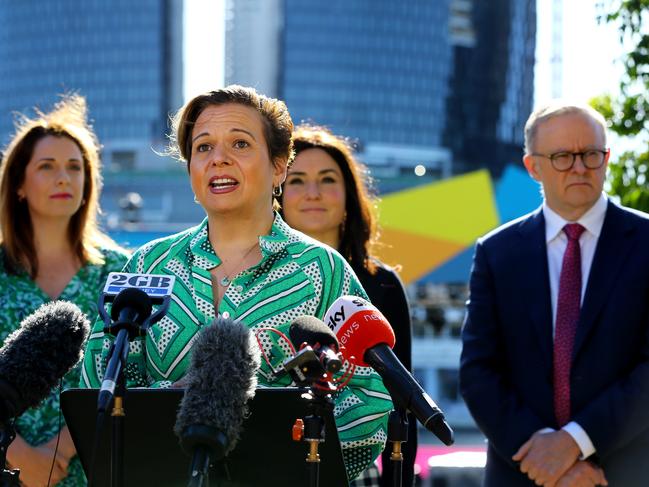Vikki Campion: New ALP digital laws belong in a totalitarian regime
The Albanese government wants to punish digital publishers that challenge the government’s official line. If these laws go through as drafted, we must swallow the government propaganda or be censored, writes Vikki Campion.
Opinion
Don't miss out on the headlines from Opinion. Followed categories will be added to My News.
Of all the issues that will become the focus of the Albanese Government’s proposed digital misinformation laws, it won’t be the live broadcast of child exploitation on social media platforms. It will be that people might say something the government disagrees with.
True moral north has varied over the years, but the essential four points of the compass that have been historically censored remain the same: rape, torture, and criminal acts against people who don’t have the agency to understand what is happening to them.
But now the censors disregard the rape and torture and worry more about your opinions on climate change and gender.
Labor’s Communications Minister Michelle Rowland claimed on her Facebook: “Misinformation and disinformation online sows division, undermines trust and can threaten public health and safety.”
Under the draft bill, this statement by the Minister on Facebook is true and alternate views are disinformation.
My view, that Rowland’s plan reduces the whole of censorship to the lowest common denominator, could also be punished for misinformation. Under the draft, Rowland, the ABC, and the University of Beijing, are exempt from misinformation.

Your experiences without the protection of government-sanctioned media and school institutions, cannot just be disregarded and ignored as they are now, but also punished.
How can you determine that one view is wrong unless you hear an alternate view?
If laws quashing public opinion to favour the government-sanctioned view existed half a century ago, it would now be illegal to be gay, and smoking would be healthy.
Only half a lifetime ago, the NSW state cabinet approved indeterminate sentences to be imposed on “sexual offenders” because the government at the time believed “homosexual perversion had reached an alarming magnitude in Sydney”.
Before the legal change, indeterminate sentences were applied to “convicted mental defectives and habitual criminals”.
Well into the 70s, works that “encouraged lesbianism” were banned at the border.
Only 56 years ago, the federal Department of Agriculture was hiring agronomist graduates on $4364 per annum to conduct tobacco crop improvement hybridisation trials. Doctors as late as 1964 were reported as saying: “If a smoker can genuinely cut down to, say, a cigarette after each meal, I think that is all right.”
Both these examples are from official Government Gazettes. The official government line.
Around the same time, thalidomide was a government-approved drug.
Passive smoking investigations did not come from a government enthused on tobacco export markets. A better compass direction has come only through the ventilating of alternate views. If the same thought laws existed when the government saw homosexuality as a perversion, we’d be stuck in a world of heterosexual chain-smokers.
Governments were wrong in the past, will be wrong in the future and are wrong now – so they should get their hands off the compass needle.
When we banned books in the past, at least you knew which titles were excluded: A Commonwealth Gazette from August 1971 shows the Department of Customs and Excise banned 70 books and magazines from entry including two volumes of the English version of Penthouse, The American Lesbians, Diary of a Barmaid, How To Be An Erotic Man by Roger Warren, and How To Be An Erotic Woman by Joy Warren.
This gazetted list, was published and open for public criticism and comment – a privilege that the thoughts and ideas to be cancelled as “misinformation” online will be denied. At least the open forum of ideas could discuss if the Diary of a Barmaid in 1971 was an imminent threat to the moral fabric of Australia, or a silly little book.
Whether social media posts can corrupt their viewers is also up for debate. Rowland’s Facebook commentary does not sway my opinion of the contrary. But censorship in this opaque form, administrated by public servants in a government department, will be a corrupting process restricting the liberty to hear alternate views.
The faceless moderator, cancelling at whim, opinion, ideas and experiences, will have all the power.
It will be impossible for the average person to question their decisions – or even to know what they are.
This censoring of views is not restricted to the forthcoming bill of Rowland; it’s a well-practised form in totalitarian regimes.
How will we discern true north from political opinions if only a narrow band from the compass is allowed to be viewed? How do we counter the opinions that politicians like Climate Change Minister Chris Bowen continue to sprout? Where nuclear is entirely unfeasible, even though more than 30 other countries in the world are doing it.
Or where Deputy Prime Minister Richard Marles can rack up $3.7m in secret VIP jet rides and change the regulations so they stay a secret.
Now, the Albanese government wants to punish digital publishers that challenge the government’s official line.
If these laws go through as drafted, we must swallow the government propaganda or be censored.
When it comes to basic ideas, of whether Bowen is wrong on nuclear, or Marles deserves secret jet rides with secret friends, shouldn’t each individual be their own censor?
Meanwhile, what should be censored is children being exploited on these same platforms.
Yet the parliament has to drag social media companies kicking and screaming into closed committees even to ask them a question, and even then, the answer is “it’s all too hard”.
They can censor your opinion on climate change, not an exploited child live streamed from the Philippines.





